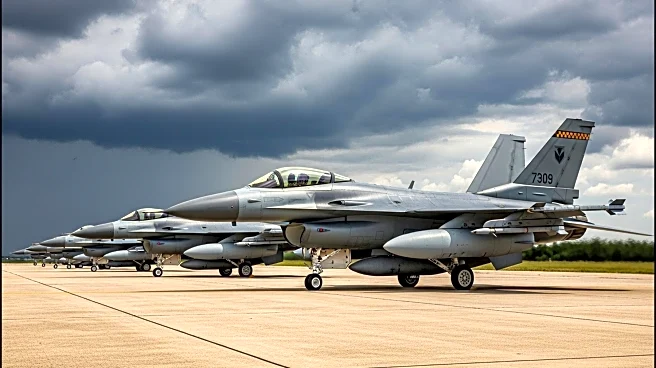What is the story about?
What's Happening?
European officials are addressing the threat of hybrid warfare allegedly waged by Russia, which includes cyberattacks, election interference, and airspace violations. European Commission President Ursula von der Leyen emphasized the seriousness of these incidents, describing them as part of a concerted campaign to destabilize the region. NATO members have pledged to increase defense spending to 5% of GDP to counter these threats. The European Union is considering defense projects like the Eastern Flank Watch initiative, which proposes a 'drone wall' to protect against UAV incursions. However, there is some skepticism about the feasibility of such projects, with Germany's defense minister expressing reservations.
Why It's Important?
The increase in defense spending and mobilization of resources reflects the heightened security concerns in Europe due to Russia's actions. This shift could impact U.S. defense policy, as NATO allies collectively aim to bolster their military capabilities. The focus on hybrid warfare highlights the evolving nature of global conflicts, where traditional military engagements are supplemented by cyber and informational tactics. The U.S. may need to adapt its defense strategies to support European allies and address similar threats domestically. The economic implications include potential shifts in resource allocation from other sectors to defense, affecting industries like automotive in Germany.
What's Next?
European nations are expected to continue discussions on implementing defense initiatives like the drone wall, despite differing opinions on their practicality. NATO's commitment to increased defense spending may lead to further collaboration among member states to develop comprehensive security strategies. The U.S. might consider similar measures to align with NATO's goals and address hybrid warfare threats. Political leaders and defense experts will likely engage in ongoing debates about the balance between traditional military spending and investments in cybersecurity and other non-conventional defense mechanisms.
Beyond the Headlines
The concept of hybrid warfare challenges traditional definitions of conflict, requiring new legal and ethical frameworks to address actions that fall in the 'twilight of deniability.' This could lead to long-term shifts in international law and defense policies, as countries seek to establish norms for responding to non-traditional threats. The cultural impact includes increased public awareness and concern about cybersecurity and information integrity, potentially influencing political discourse and public policy.















